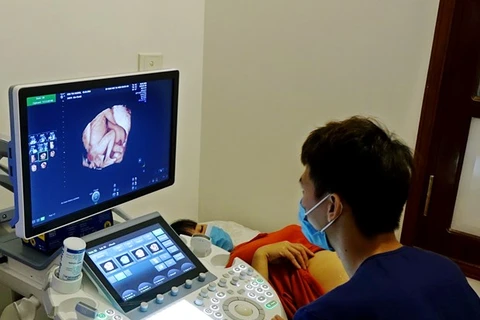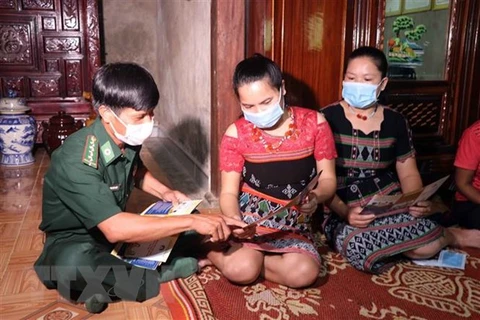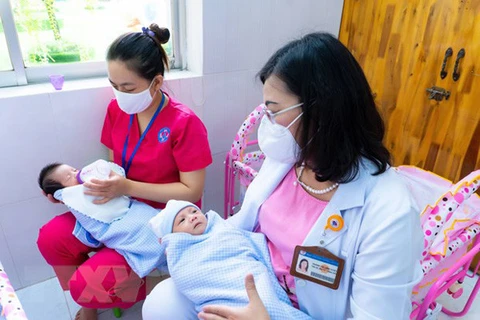 A village-based birth attendant (left) performs antenatal care for a local woman (centre) in the Central Highlands province of Gia Lai. (Photo: VNA)
A village-based birth attendant (left) performs antenatal care for a local woman (centre) in the Central Highlands province of Gia Lai. (Photo: VNA) More than 70% of pregnant women in these regions only had one check-up during their entire pregnancy, while only 34.7% of childbirths are assisted by a trained birth attendant.
These figures are included in the results of the study “Leave no one behind: Innovative interventions to reduce maternal mortality in ethnic minority regions of Vietnam,” which was realised by United Nations Population Fund (UNFPA) and MSD for Mothers, in collaboration with the Ministry of Health (MoH).
As part of the project, researchers from Hanoi University of Public Health conducted a survey in 60 of the most disadvantaged communes of six poor ethnic minority provinces, which are Lai Chau, Son La, Bac Kan, Kon Tum, Gia Lai and Dak Nong.
The study also revealed that around 70% of women have home births, which can pose risks of complications during the delivery, or in the postpartum period.
In terms of family planning, only 53% of mothers in these locations use contraceptives, which is 19 percentage points lower than the national average (72%).
Meanwhile, local women’s unmet needs in family planning are over 17%, almost double the national average of 10%.
In particular, for Thai ethnic women, the unmet needs for family planning are significantly high, at 49%.
At the dissemination workshop on the project, UNFPA representative to Vietnam Naomi Kitahara talked about her observations during the field trip to Lai Chau province.
She said: “Ethnic minorities often reside in such remote and mountainous locations far away from any health facilities.
“And even in those locations, skilled medical personnel and necessary medical equipment supplies are very limited.”
The report also pointed out that there’s room for improvement in training for staff at commune- and district-level medical facilities, both public and private, in assessment, risk detection, and response to emergency cases during pregnancy.
This knowledge is also crucial to ethnic mothers and their family members, which is why the study recommends educational programmes for safe pregnancy and childbirth, taking into account local culture and traditions.
MSD Vietnam general director Jennifer Cox said: “When a woman can have proper maternal care, she and her family, community and nation thrive.”
Noting that Vietnam was one of the only six countries that achieved the Millennium Development Goal (MDG) of improving maternal health in 2015, Kitahara added: “The findings of the survey constitute good evidence for the development of innovative interventions in order to ensure the provision of quality sexual and reproductive health services to prevent maternal deaths, thus contributing to Vietnam's efforts to achieve the SDG target on maternal mortality by 2030.”
Addressing the event, director of the MoH’s Department of Maternal and Child Health Dinh Anh Tuan said: “Reducing maternal mortality among ethnic minorities is a priority in the Government’s development agenda.
“The project is an important contribution to innovative interventions, which are based on effective measures proven in the past and modern applications, such as technology in management and access to services, information, consultancy and even remote medical examination.”
The project is funded by MSD for Mothers and MSD Vietnam (1.2 million USD) and UNFPA (810,000 USD).
It aims at increasing access to and utilisation of integrated, quality and voluntary sexual and reproductive health services amongst ethnic minorities; improving the capacity on emergency obstetric care management in remote mountainous localities; and building a village-based birth attendant network in remote ethnic minority localities./.
VNA























